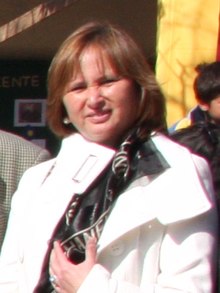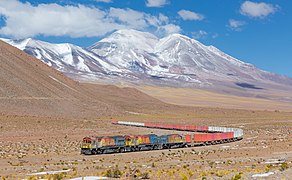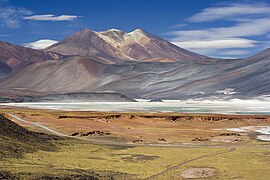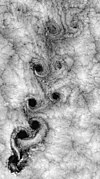Portal:Chile
| Main page | Assessment | Articles | Templates | Translation | Noticeboard | To Do List | Portal |
The Chile Portal

Chile, officially the Republic of Chile, is a country in western South America. It is the southernmost country in the world and the closest to Antarctica, stretching along a narrow strip of land between the Andes Mountains and the Pacific Ocean. Chile had a population of 17.5 million as of the latest census in 2017 and has a territorial area of 756,102 square kilometers (291,933 sq mi), sharing borders with Peru to the north, Bolivia to the northeast, Argentina to the east, and the Drake Passage to the south. The country also controls several Pacific islands, including Juan Fernández, Isla Salas y Gómez, Desventuradas, and Easter Island, and claims about 1,250,000 square kilometers (480,000 sq mi) of Antarctica as the Chilean Antarctic Territory. The capital and largest city of Chile is Santiago, and the national language is Spanish.
Spain conquered and colonized the region in the mid-16th century, replacing Inca rule, but failed to conquer the independent Mapuche people who inhabited what is now south-central Chile. Chile emerged as a relatively stable authoritarian republic in the 1830s after their 1818 declaration of independence from Spain. During the 19th century, Chile experienced significant economic and territorial growth, putting an end to Mapuche resistance in the 1880s and gaining its current northern territory in the War of the Pacific (1879–83) by defeating Peru and Bolivia. In the 20th century, up until the 1970s, Chile underwent a process of democratization and experienced rapid population growth and urbanization, while relying increasingly on exports from copper mining to support its economy. During the 1960s and 1970s, the country was marked by severe left-right political polarization and turmoil, which culminated in the 1973 Chilean coup d'état that overthrew Salvador Allende's democratically elected left-wing government. This was followed by a 16-year right-wing military dictatorship under Augusto Pinochet, which resulted in more than 3,000 deaths or disappearances. The regime ended in 1990, following a referendum in 1988, and was succeeded by a center-left coalition, which ruled until 2010.
Chile is a high-income economy and is one of the most economically and socially stable nations in South America. Chile also performs well in the region in terms of sustainability of the state and democratic development. Chile is a founding member of the United Nations, the Community of Latin American and Caribbean States (CELAC), and the Pacific Alliance, and joined the OECD in 2010. (Full article...)

María José Reyes Moore and Juan René Duarte Becerra were murdered in July 2012 in an antique shop in Lolol, Colchagua Province, O'Higgins Region, Chile. Both victims had visited the shop as customers and were attacked and decapitated by shop owner Óscar López Rodríguez.
The murderer was shot and killed by police responding to the scene of the Reyes murder. An analysis of accounts by people who knew him suggests that he was suffering from psychosis and "mystical delusions". He has been labeled the "Monster of Lolol" by Chilean media. (Full article...)
Selected biography -
Rebeca del Rosario Cofré Calderón (born 23 August 1962) is a Chilean politician and member of the Independent Democrat Union (UDI). In 2008 she was elected mayor of Chépica, a small commune in Colchagua Province, after running unsuccessfully for the same office four years before. She was re-elected to the office in 2012. In 2013, she was named as one of the 100 Leading Women of Chile by Mujeres Empresarias and the Economía y Negocios (Economy and Business) section of El Mercurio newspaper. (Full article...)
Selected article -
The Chiloé Archipelago (Spanish: Archipiélago de Chiloé, pronounced [tʃiloˈe], locally [ʃiloˈe]) is a group of islands lying off the coast of Chile, in the Los Lagos Region. It is separated from mainland Chile by the Chacao Channel in the north, the Sea of Chiloé in the east and the Gulf of Corcovado in the southeast. All islands except the Desertores Islands form Chiloé Province. The main island is Chiloé Island. Of roughly rectangular shape, the southwestern half of this island is a wilderness of contiguous forests, wetlands and, in some places, mountains. The landscape of the northeastern sectors of Chiloé Island and the islands to the east is dominated by rolling hills, with a mosaic of pastures, forests and cultivated fields.
The archipelago is known within Chile for its distinctive folklore, mythology, potatoes, cuisine and unique architecture. The culture of Chiloé is the result of mixing of Huilliche, Spanish and Chono influences in centuries of isolation without much contact with the rest of Chile or the Western World. Its cool temperate climate, abundance of sea resources and large and lush forests have also played a major role in shaping life in the islands. (Full article...)
General images
Did you know (auto generated)

- ... that Peruvian foreign minister Manuel María Gálvez Egúsquiza was arrested by Chilean troops for refusing to sign peace with the cession of territory during the War of the Pacific?
- ... that Salar de Pedernales in Chile features dark slope streaks resembling dark slope streaks on Mars?
- ... that Rincón Chileno was nicknamed the "second Chilean consulate" by the Chilean immigrant community in Los Angeles?
- ... that Salar de Pajonales in Chile has been used as an analogue for environments on Mars?
- ... that the Peruvian Civil Guard officer Mariano Santos Mateo was nicknamed the Brave Man of Tarapacá because he captured a banner of a Chilean military unit during the Battle of Tarapacá?
- ... that the Swedish broadcaster organising the Eurovision Song Contest 1975 refused to allow the contest to be shown in Chile, as a protest against the country's military dictatorship?
Topics
Categories
Recognized content
| This is a list of recognized content, updated weekly by JL-Bot (talk · contribs) (typically on Saturdays). There is no need to edit the list yourself. If an article is missing from the list, make sure it is tagged (e.g. {{WikiProject Chile}}) or categorized correctly and wait for the next update. See WP:RECOG for configuration options. |
Featured articles
- Chilean battleship Almirante Latorre
- Almirante Latorre-class battleship
- Cerro Azul (Chile volcano)
- Calabozos
- El Tatio
- Chilean cruiser Esmeralda (1883)
- Guallatiri
- Hudson Volcano
- Laguna del Maule (volcano)
- Mothers of the Disappeared
- Ojos del Salado
- Pali-Aike volcanic field
- Pisco sour
- Socompa
- South American dreadnought race
- Taapaca
Good articles
- 2010 Pichilemu earthquakes
- 2018 Santiago ePrix
- Agustín Ross Cultural Centre
- Angata
- Los Ángeles Negros
- Apacheta-Aguilucho volcanic complex
- Argentine–Chilean naval arms race
- Atamu Tekena
- Orlando Bosch
- Lorenza Böttner
- Sara Braun
- Monte Burney
- Battle of Caldera Bay
- Felipe Camiroaga
- Chilean battleship Capitán Prat
- Carménère
- José María Caro Martínez
- Chile at the 2014 Winter Paralympics
- Coat of arms of Pichilemu
- Dutch expedition to Valdivia
- El Laco
- El Negrillar
- Milton Friedman
- Fueguino
- Irruputuncu
- Laguna Miscanti
- Laguna del Negro Francisco
- Lascar (volcano)
- Lastarria
- Lazufre
- Licancabur
- Licancabur Lake
- Llullaillaco
- Nevado de Longaví
- Manuel Foster Observatory
- Monturaqui
- Irene Morales
- John Thomas North
- Obligation to Negotiate Access to the Pacific Ocean
- Olca-Paruma
- USS Oneota (1864)
- La Pacana
- Parinacota (volcano)
- Patio 29
- Pichilemu
- Colegio de la Preciosa Sangre de Pichilemu
- Salar de Punta Negra
- Reclus (volcano)
- Murders of María José Reyes and Juan Duarte
- Sammis Reyes
- Riro Kāinga
- Sairecabur
- Salar Ignorado
- San Pedro (Chile volcano)
- Sollipulli
- Tacora
- Tilocálar
- Nevado Tres Cruces
- Tupungatito
- Tuyajto Lake
Featured pictures
-
360-degree Panorama of the Southern Sky edit
-
A 360 degree panorama of a unique cloudscape over La Silla
-
Culpeo MC
-
FCAB EMD GT22CU-3 San Pedro - Ascotan
-
Géiseres del Tatio, Atacama, Chile, 2016-02-01, DD 03-05 HDR
-
Laguna Miñiques, Chile, 2016-02-08, DD 33-38 PAN
-
Laser Towards Milky Ways Centre
-
Miscanti Lagoon near San Pedro de Atacama Chile Luca Galuzzi 2006
-
Moai Rano raraku
-
SQM GE 289A Boxcab Carmelita - Reverso
-
The European Extremely Large Telescope
-
Volcán Aucanquilcha, Chile, 2016-02-10, DD 11
-
Volcán San Pedro, Chile, 2016-02-09, DD 18
-
Vortex-street-1
WikiProjects
Related portals
New articles
Rules | Match log | Results page (for watching) | Last updated: 2025-01-01 20:02 (UTC)
Note: The list display can now be customized by each user. See List display personalization for details.
- Luis Riveros (edit | talk | history | links | watch | logs | tools) by ImSnot (talk · contribs · new pages (7)) started on 2025-01-01, score: 35
- Stoned Jesus (edit | talk | history | links | watch | logs | tools) by Seacactus 13 (talk · contribs · new pages (3)) started on 2024-12-31, score: 16
- P/2015 PD229 (Cameron–ISON) (edit | talk | history | links | watch | logs | tools) by KyloRen2017 (talk · contribs · new pages (69)) started on 2024-12-31, score: 16
- Carlos Morla Vicuña (edit | talk | history | links | watch | logs | tools) by Janitoalevic (talk · contribs · new pages (9)) started on 2024-12-31, score: 43
- List of Lauv live performances (edit | talk | history | links | watch | logs | tools) by Mynameisaliffathi (talk · contribs · new pages (3)) started on 2024-12-31, score: 14
- Ephemeral Gaze (edit | talk | history | links | watch | logs | tools) by Artemisialufkin (talk · contribs · new pages (1)) started on 2024-12-31, score: 29
- La Capitana Shipwreck of 1654 (edit | talk | history | links | watch | logs | tools) by Atlantic306 (talk · contribs · new pages (4)) started on 2024-12-30, score: 20
- Thomas Cochrane campaign (edit | talk | history | links | watch | logs | tools) by 45.173.72.69 (talk · contribs · new pages (1)) started on 2024-12-30, score: 83
- Canal 6 (Chile) (edit | talk | history | links | watch | logs | tools) by RandomMe98 (talk · contribs · new pages (17)) started on 2024-12-30, score: 59
- Canal 9 TVN Señal 2 (edit | talk | history | links | watch | logs | tools) by RandomMe98 (talk · contribs · new pages (17)) started on 2024-12-30, score: 91
- C/1988 A1 (Liller) (edit | talk | history | links | watch | logs | tools) by C messier (talk · contribs · new pages (11)) started on 2024-12-30, score: 16
- Carlos José Pereira de Lucena (edit | talk | history | links | watch | logs | tools) by LodeRunner (talk · contribs · new pages (2)) started on 2024-12-30, score: 14
- Pietra Rivoli (tennis) (edit | talk | history | links | watch | logs | tools) by Haddad Maia fan (talk · contribs · new pages (9)) started on 2024-12-30, score: 14
- 2020s in history (edit | talk | history | links | watch | logs | tools) by Sm8900 (talk · contribs · new pages (22)) started on 2024-12-29, score: 20
- Passports of the Mercosur (edit | talk | history | links | watch | logs | tools) by VictiniFan360 (talk · contribs · new pages (1)) started on 2024-12-29, score: 16
- Luis Guzmán (footballer) (edit | talk | history | links | watch | logs | tools) by Barr Theo (talk · contribs · new pages (86)) started on 2024-12-28, score: 31
- Aurora's 2018-2019 Tour (edit | talk | history | links | watch | logs | tools) by Bloodinthewine (talk · contribs · new pages (6)) started on 2024-12-28, score: 23
- Asplenium dareoides (edit | talk | history | links | watch | logs | tools) by Flora and fauna man (talk · contribs · new pages (3)) started on 2024-12-28, score: 16
- Diego González (footballer, born 1997) (edit | talk | history | links | watch | logs | tools) by ImSnot (talk · contribs · new pages (7)) started on 2024-12-27, score: 23
- List of music venues in South America (edit | talk | history | links | watch | logs | tools) by JuxtaposedJacob (talk · contribs · new pages (11)) started on 2024-12-26, score: 30
- Iván Zafarana (edit | talk | history | links | watch | logs | tools) by ImSnot (talk · contribs · new pages (7)) started on 2024-12-26, score: 23
- María Antonia Morales (edit | talk | history | links | watch | logs | tools) by MoviesandTelevisionFan (talk · contribs · new pages (48)) started on 2024-12-26, score: 31
- Santiago (meme character) (edit | talk | history | links | watch | logs | tools) by Charliephere (talk · contribs · new pages (5)) started on 2024-12-26, score: 28
- White Chileans (edit | talk | history | links | watch | logs | tools) by Lulasaurius (talk · contribs · new pages (3)) started on 2024-12-24, score: 44
- Ectinorus (edit | talk | history | links | watch | logs | tools) by Reconrabbit (talk · contribs · new pages (9)) started on 2024-12-25, score: 16
- Spanish frigate Reina Blanca (edit | talk | history | links | watch | logs | tools) by Mdnavman (talk · contribs · new pages (8)) started on 2024-12-25, score: 22
- Alto Palena–Encuentro River dispute (edit | talk | history | links | watch | logs | tools) by Chaotic Enby (talk · contribs · new pages (13)) started on 2024-12-24, score: 37
- Florencia Saavedra (edit | talk | history | links | watch | logs | tools) by Lunar Spectrum96 (talk · contribs · new pages (11)) started on 2024-12-24, score: 43
- Theodore C. Marceau (edit | talk | history | links | watch | logs | tools) by Dudhhr (talk · contribs · new pages (8)) started on 2024-12-24, score: 16
- Domingo Arrillaga (edit | talk | history | links | watch | logs | tools) by Barr Theo (talk · contribs · new pages (86)) started on 2024-12-23, score: 14
- The Gods We Can Touch Tour (edit | talk | history | links | watch | logs | tools) by Bloodinthewine (talk · contribs · new pages (6)) started on 2024-12-23, score: 29
- Paula Jiménez (edit | talk | history | links | watch | logs | tools) by Lachie23 (talk · contribs · new pages (8)) started on 2024-12-23, score: 14
- Dulcibella (edit | talk | history | links | watch | logs | tools) by KhantWiki (talk · contribs · new pages (2)) started on 2024-12-22, score: 32
- What Happened to the Earth? (edit | talk | history | links | watch | logs | tools) by Bloodinthewine (talk · contribs · new pages (6)) started on 2024-12-22, score: 23
- SS Erlangen (1929) (edit | talk | history | links | watch | logs | tools) by Marshelec (talk · contribs · new pages (3)) started on 2024-12-21, score: 16
- 2025 Club Atlético Boca Juniors season (edit | talk | history | links | watch | logs | tools) by Cabj94 (talk · contribs · new pages (1)) started on 2024-12-21, score: 14
- Karla Constant (edit | talk | history | links | watch | logs | tools) by Atremari (talk · contribs · new pages (4)) started on 2024-12-20, score: 43
- 2010s in South American history (edit | talk | history | links | watch | logs | tools) by Sm8900 (talk · contribs · new pages (22)) started on 2024-12-20, score: 68
- Rebecca Baker (edit | talk | history | links | watch | logs | tools) by Lachie23 (talk · contribs · new pages (8)) started on 2024-12-20, score: 14
- Tessa Reid (edit | talk | history | links | watch | logs | tools) by Lachie23 (talk · contribs · new pages (8)) started on 2024-12-20, score: 14
- 2025 Women's Junior Oceania Cup (edit | talk | history | links | watch | logs | tools) by Lachie23 (talk · contribs · new pages (8)) started on 2024-12-20, score: 28
- Ministry of Social Development and Family (edit | talk | history | links | watch | logs | tools) by Pristino (talk · contribs · new pages (5)) started on 2024-12-19, score: 31
- Paige Blake (edit | talk | history | links | watch | logs | tools) by Lachie23 (talk · contribs · new pages (8)) started on 2024-12-19, score: 14
- 2024–25 UAB Blazers women's basketball team (edit | talk | history | links | watch | logs | tools) by RedSox39 (talk · contribs · new pages (23)) started on 2024-12-19, score: 14
- The San Lucas Band (edit | talk | history | links | watch | logs | tools) by GanzKnusper (talk · contribs · new pages (10)) started on 2024-12-18, score: 14
- 1929–30 Yale Bulldogs men's ice hockey season (edit | talk | history | links | watch | logs | tools) by PensRule11385 (talk · contribs · new pages (33)) started on 2024-12-18, score: 14
- Janiah Barker (edit | talk | history | links | watch | logs | tools) by Swagtennis (talk · contribs · new pages (3)) started on 2024-12-15, score: 16
Associated Wikimedia
The following Wikimedia Foundation sister projects provide more on this subject:
-
Commons
Free media repository -
Wikibooks
Free textbooks and manuals -
Wikidata
Free knowledge base -
Wikinews
Free-content news -
Wikiquote
Collection of quotations -
Wikisource
Free-content library -
Wikiversity
Free learning tools -
Wikivoyage
Free travel guide -
Wiktionary
Dictionary and thesaurus




























































